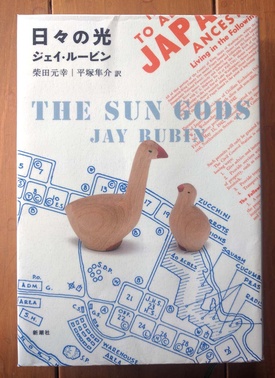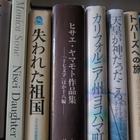Jay Rubin, a Japanese literature scholar and English translator who is also known for his English translations of Haruki Murakami, a writer with a worldwide readership, has written a novel called "Hi no Hikari," which has also been much talked about. The story takes place in Japan and the United States during the Pacific War. The original title is "The Sun Gods," and according to the translator's afterword, it was published in 2015 by a small Seattle publisher, Chin Music Press.
The Japanese version was translated by Motoyuki Shibata, an American literature scholar and translator known for his co-authored work with Haruki Murakami on "Translation Night Talks," and young translator Junsuke Hiratsuka, with each chapter taking turns. It was published by Shinchosha two months after the English version was released. The Japanese version was likely being prepared at the same time.
Rubin was born in Washington DC in 1941 and has served as professor at the University of Washington and Harvard University. He has translated many of Japan's most representative modern and contemporary authors, including Akutagawa Ryunosuke, Natsume Soseki, and Murakami Haruki, and his books include "Fuzo Kairan: The Meiji State and Literary Censorship" (Yoshishobo Publishing) and "Haruki Murakami and the Music of Words" (Shinchosha).
Rubin, who is well-versed in Japanese literature and the Japanese language, published his first novel, "Days of Light." However, it was not written recently, and the original version was completed at the end of 1987. However, it was his debut work, and he had no track record as a translator at the time. Also, not much was known about the internment of Japanese Americans during the war in the United States, which may have been the reason why it was not published.
However, the fact of the internment only began to attract attention after then-President Reagan signed the Internment Compensation Act in 1988. Around the same time, concerns were also spreading about the rise of xenophobia, which was seen as a threat to the American economy due to Japan's economic power.
In 1981, Joy Kogawa, a second-generation Japanese-Canadian female writer, published Obasan, which was highly praised and translated and published in Japan as Lost Homeland in 1983. Another second-generation Japanese-Canadian writer, Yoshiko Uchida, published DESERT EXILE: The Uprooting of a Japanese American Family in 1982, a non-fiction work, which was also published in Japan in 1985 as Wilderness Driven People: Records of a Japanese American Family in Wartime (Iwanami Shoten).
Looking at it this way, can we say that the publication of Rubin's works was primarily due to his success in translating works by Haruki Murakami and others, and that his works were then evaluated as excellent?
"Hikari no Hikari" is a story about a man searching for his mother. When the protagonist, Bill, was a child, he lived with his father, a white pastor who presided over a Japanese Christian church in Seattle. His father was attracted to a Japanese woman named Mitsuko, who was staying with a Japanese member of the church, as she looked after Bill, and the two got married.
However, after the Japanese attack on Pearl Harbor, her father grew hostile towards Japan and the Japanese people, left the Japanese church, and his relationship with Mitsuko deteriorated. Mitsuko and Bill, who was more attached to Mitsuko than his father, were sent to an internment camp, but Bill was eventually taken in by her father, while Mitsuko chose to be repatriated to Japan.
After the war, Bill, now an adult, is unable to forget about Mitsuko and travels to Japan to search for her using only faint clues. Along the way, he makes new encounters and uncovers unknown facts from the past, leading to a dramatic conclusion to the story, much like a mystery.
The story moves back and forth between the prewar period and the period before the Tokyo Olympics, skillfully guiding the reader through different periods. This is reminiscent of Jeanne Wakatsuki Houston's novel " The Legend of Fire Horse Woman, " which is also set in Japan and the United States and tells the story of a woman spanning three generations from the first generation of immigrants.
The background is well written and based on historical facts, covering the situation of Japanese Americans in Seattle from the attack on Pearl Harbor, the persecution, the issue of loyalty to the country that Japanese Americans and Japanese faced in the internment camps, and the devastation of the atomic bomb. The story gradually picks up steam, drawing the reader in.
However, there is one thing that bothers me. This is purely my personal opinion, but the words that the main characters use to express their inner thoughts seem unnatural. They easily go beyond the range of what would naturally come out of a character's mind, and it seems as if they are being used for the sake of the story.
For example, Bill's father, a pastor named Tom, is attracted to Mitsuko and marries her, but as Japan's military power grows, he detests all things Japanese, and even confronts Mitsuko, saying things like, "Do you want to bow down to the emperor and praise the divine army?" He also condescendingly tells her, "We need to get to work on helping you become more American." It is a simple question: would a man who is close to the Japanese and a member of the clergy say such things to the woman he loves?
Also, when Bill tracked down and visited Mitsuko's brother in Japan after the war, the brother, who hated America, insulted Bill, who was a small child during the war, saying, "You are an accomplice of the devils who killed my family."
However, this discomfort may be due to the fact that I have become accustomed to a pro-Japanese sentiment from continually reading works about similar eras and themes written by Japanese Americans and Japanese people.
(Titles omitted)
© 2017 Ryusuke Kawai







